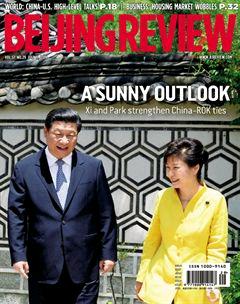New Evidence Unveiled
By+lan+Xinzhen
‘If there are recruitment activities to at-tract laborers, please tell people not to get involved. So far about 30,000 laborers have been sent to Hulin from other areas, and most of them were already dead. Treated as beggars, they were beaten, verbally abused and not paid at all. Please tell others that they must not apply.”
This is an excerpt from a letter written by Zhang Jingchun, a laborer in Japanese-occupied Hulin County, northeast Chinas Heilongjiang Province, in 1939. Zhang sent the letter to Wang Fuxiang in Liaozhong County, Fengtian Province, now known as Liaoning Province, on August 13 of that year. But the letter never reached the recipient, for it was disposed of by the Japanese Kwantung Army.
Seventy-five years later, the letter was found by staff at the Jilin Provincial Archives in northeast China as they looked through the postal inspection records that once belonged to the very same army.
“This proves that the Japanese army enslaved laborers when it invaded China,”said Mu Zhanyi, Deputy Curator of the Jilin Provincial Archives.
During Japans war of aggression against China (1931-45), Japanese military police censored letters, telegraphs and phone calls by Japanese soldiers and expatriates, officials and the general public in Japanese-occupied areas, as well as missionaries and diplomats from other countries. A large amount of correspondence documenting the atrocities of the Japanese army, complaining about their rule, or containing information deemed useful to them were deleted, seized or destroyed. The army also kept abstracts of their content which were compiled into reports to higher military commanders on a weekly or monthly basis.
After Japan surrendered in August 1945, the Japanese army did not have time to destroy all the records. In 1953, the documents were discovered and stored in the Jilin Provincial Archives.
On July 1, the Jilin Provincial Archives released new research results, making public 45,000 letters written between 1937 and 1945, more than half of which are correspondences between Japanese. This April, the archives disclosed the results of their research for the first time ever.
The postal inspection records revealed that Japanese military polices censorship covered not only Manchukuo, a puppet state that Japan established in northeast China and Inner Mongolia, but also central and south China as well as Indonesias Java. Abstracts of the censored correspondences recorded the atrocities committed by Japanese soldiers including looting, killing and raping. The invading army carried out strategic bombing of civilian and industrial targets, built secret military facilities, tested chemical and biological weapons on human prisoners, used civilians and prisoners of war as forced laborers, implemented deceptive immigration policies, and plundered the economy of occupied areas. The documents also showed that some Japanese servicemen were weary of the war.endprint
The postal inspection records also contain accounts of how Chinese laborers were abused to death. The December 1940 issue of the Postal Review Monthly recorded a letter from yasuda Hisashi, who was then working in a warehouse of the Japanese Kwantung Army in Jiamusi City in Heilongjiang, to Kojima Tomoaki, a resident in Japans Kanazawa City. The letter, dated December 6, 1940, reads, “The Chinese are used like Manchurian horses, and disobedient workers are beaten.”
A letter dated May 17, 1940, was written by Koyama Suihei in Heilongjiangs Dongning County to Koyama Tokutaro in Japans Osaka City. Suihei was a member of the Fujita Group, a Japanese construction team that was building military facilities in China at the time. The letter says that typhoid fever struck Dongning, but Chinese workers were denied medical assistance, leading to many deaths. It reads, “On April 20, 24 Chinese workers employed by the Fujita Group died, while one to two deaths were reported daily among the coolies of other troops.”
The brutality of the Japanese army in World War II has been exposed by the postal inspection records, Mu said. According to him, the documents, created by persons who experienced and witnessed Japans aggression against China, are incontrovertible in their objectivity and authenticity.
“These rich and vivid materials give us an opportunity to look at history from a unique perspective,” Mu said. “The heinous crimes committed by Japanese troops have been proved with the evidence they themselves left behind.”endprint

